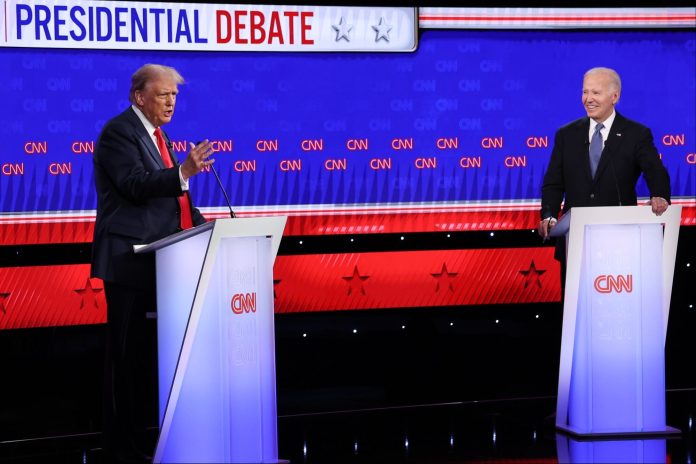The first 2024 presidential debate on Thursday saw President Joe Biden and former President Donald Trump go head-to-head in Atlanta, Georgia, moderated by CNN.
The two candidates sparred on everything from taxes to the national debt, highlighting crucial economic issues that are top of mind for entrepreneurs. Fox Business reported that U.S. stock futures were higher on Friday following the debate.
The big question was the economy. A March Gallup poll showed that inflation was the top concern for most Americans (55%), as well as the economy (52%) and federal spending (51%).
Donald Trump (L) and Joe Biden (R). Photo by Justin Sullivan/Getty Images
Here’s where the candidates stand on key issues, including business and the economy.
Inflation
CNN lead anchor Jake Tapper began the debate with a question on inflation, noting that while inflation has recently slowed, the prices of groceries, homes, and other essentials remain high.
“What do you say to voters who feel they are worse off under your presidency than they were under President Trump?” Tapper asked Biden to begin the debate.
Related: RealPage Rent Price-Fixing Probe Escalates With FBI Raid
Biden said that he stepped into leadership in a “terrible” economy.
“The combination of what I was left with and corporate greed are the reason why we’re in this problem right now,” he said.
Trump painted a different picture.
“We had given them back a country where the stock market actually was higher than pre-COVID and nobody thought that was even possible,” Trump claimed.
The Dow hit a then-high in November 2020, one day after the Trump administration acquiesced to transition power to Biden.
Biden said his administration is working to tackle “shrinkflation” and “greedflation.”
In May the Dow finished above 40,000 for the first time.
Tax Cuts
Biden accused Trump of “reward[ing] the wealthy” in his economy, emphasizing that Trump had the “largest tax cut in American history” and raised the national deficit more than any other president in one term.
Erica York at The Tax Foundation told ABC News that Trump’s tax cut, the Tax Cuts and Jobs Act of 2017, was large, but not the largest in history. The Act did add $1 trillion to $2 trillion to the national debt.
Trump said that he did give voters the largest tax cut — and regulation cut — in history.
“That’s why we had all the jobs,” he claimed.
In 2019, when Trump was in office, the country saw solid job growth, with 2.1 million jobs added, according to the Bureau for Labor Statistics.
However, in 2023, under Biden, the country added more jobs, with nearly 2.7 million.
National Debt
Tapper said that under both Trump and Biden’s administrations, the national debt climbed to record highs.
Trump’s administration added $8.4 trillion in new debt and Biden’s has approved $4.3 trillion, according to the Committee for a Responsible Federal Budget.
In the face of rising national debt, “Why should top earners and corporations pay even less in taxes than they do now?” Tapper asked.
Trump said that the tax cuts were worth it because they enabled businesses to bring in more revenue with less tax.
“Companies were bringing back trillions of dollars back into our country,” Trump said.
According to economists, the tax cuts did not produce the investments or wage increases promised for the majority of U.S. workers.
Biden’s response focused on the number of billionaires in America and the low 8% rate he said they pay in taxes.
Biden said that if billionaires paid 25% in taxes, then the U.S. would be able to wipe out the national debt within a decade.
However, IRS data from 2020 shows that the top 1% of taxpayers are already paying 25.99% in income taxes.
The 8% tax rate comes from a White House report factoring in unrealized gains, or assets like stocks and gold that have yet to be sold for cash, into income calculations.
Tariffs on Imported Goods
Trump explained why a 10% tariff on goods coming into the U.S. would benefit the economy and not drive up prices.
The tariff would “force” countries importing goods “to pay us a lot of money, reduce our deficit tremendously, and give us a lot of power for other things,” Trump said.
Mainstream economists weighed in on the 10% tariff and said it would essentially create a tax increase for American households. The tariff would raise the price of food, medicine, and cars.
Biden warned that Trump will increase taxes for the middle class. He said that a 10% tariff on foreign-made goods would impact the average American to the tune of $2,500 or more in raised prices.
Biden appears to have referenced a price increase calculated by the Center for American Progress earlier this month.
Read a transcript of the debate here; or watch it in full here.
Source: entrepreneur.com

